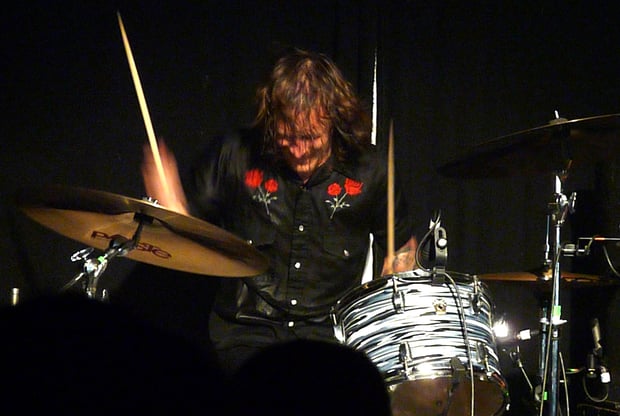 Image via Wikimedia Commons; used under Creative Commons
Image via Wikimedia Commons; used under Creative Commons
Drummer Jeff Costello has been a professional musician for almost 25 years. If it exists in the world of music, he’s seen it: terrible gigs and great ones, people both shady and sweet, good money and no money. But unlike many of us, Costello’s been playing for pay since he turned 22. Anything else he’s done for a living has been sandwiched in around his music and not vice versa.
How did he do it? For starters, he went with what worked, not with what was expected. We caught up with Costello in Cleveland, OH, where he was tracking with his band, Hug the Dog, and he enlightened us about his career behind the kit, ignoring conventional wisdom.
"Music isn’t a real career"
This is the biggest myth of all. If you listen to all the noise in society about what is or isn’t an acceptable or wise career choice, you’ll be limited to a small number of very demanding fields. Not everybody was born for a desk job. When you love something and commit to it, you’ll find a way to make it work. Music is no different; there are an infinite number of paths that could lead to success, and you only need to find one.
For Costello, the process was far from smooth, but he got there. "I didn’t just become a professional; I went back and forth from pro to amateur a few times," he admits. In his 20s, gigs came and went and the money was good and bad. He supplemented his income with side jobs: installing carpet, house cleaning, carpentry, and a desk job at a record label. But playing was always the main gig. Meanwhile, his various other jobs gave him a broad skill set. "Now that I’m a homeowner, I can fix anything!" he adds.
"You can't be competitive if you don't have a formal music education"
"A lot of other players around me went to college. They just had more debt," says Costello. For him, going straight to work instead of enrolling in a music degree or certification program wasn’t a move that he planned. He was just too busy playing to go to school.
Depending on where you aim to go in the music business, you’ll need to weigh the benefits of pursuing a musical education. School might make you some great connections and get your music in front of the right people. A solid music program will certainly improve your chops. On the other hand, touring and rehearsing could lead to the same results, without borrowing money.
[Does Music School Impact Your Career? Berklee Alumni Brite Lite Brite Feel It's 'Essential']
"If you want to play, you’d better move to Los Angeles, Nashville, or New York"
Sure, some cities have more of a scene than others, but there are successful pros in every city and county in America. "I live in the woods in New Hampshire," says Costello, "and I have for many years."
When you’re in a rural area, you do need to be ready to travel to larger population centers for shows and sessions. But you also might be the acknowledged best in your own region, the first player to get the phone call, rather than competing against a million other good players. And you have a better chance of being able to rehearse without neighbors banging on the ceiling.
[5 Crucial Factors You Have to Consider Before Moving to NY or LA for Your Music Career]
"You need to take every single gig you can get"
Drummers are notorious for playing in tons of bands at the same time. They’re always in demand and there are never enough good ones around.
"At one point I had eleven projects going at the same time. My wife complained that the only one I said no to was her," Costello explains. "I had to cut back, because I was never home."
Tired of bar gigs "where everyone gets paid but the band" and wedding shows playing the same tired material, he decided to focus on the most promising group he was working with. In doing so, new opportunities opened up. Once he stopped being on the road every night, he started getting calls for soundtrack work and studio sessions with local recording artists, replacing some of that gig money. And he had a happier partner.
"You can't have lasting relationships when you live the musician life"
Sure, it can be tough. But it's also tough when you're a doctor, lawyer, or retail manager. Life is all about balance, and any career can create work-versus-family tensions. But musicians arguably need a solid relationship more than most – someone to hold things down at home when they’re on the road, someone to help keep the lights on when the money isn’t great. "I’ve been married for 20 years," Costello says. "She is a huge, huge support system for me. I couldn’t do this without her."
Jesse Sterling Harrison is an author, recording artist, and part-time farmer. He lives in Massachusetts with his wife, three daughters, and a herd of ducks.







